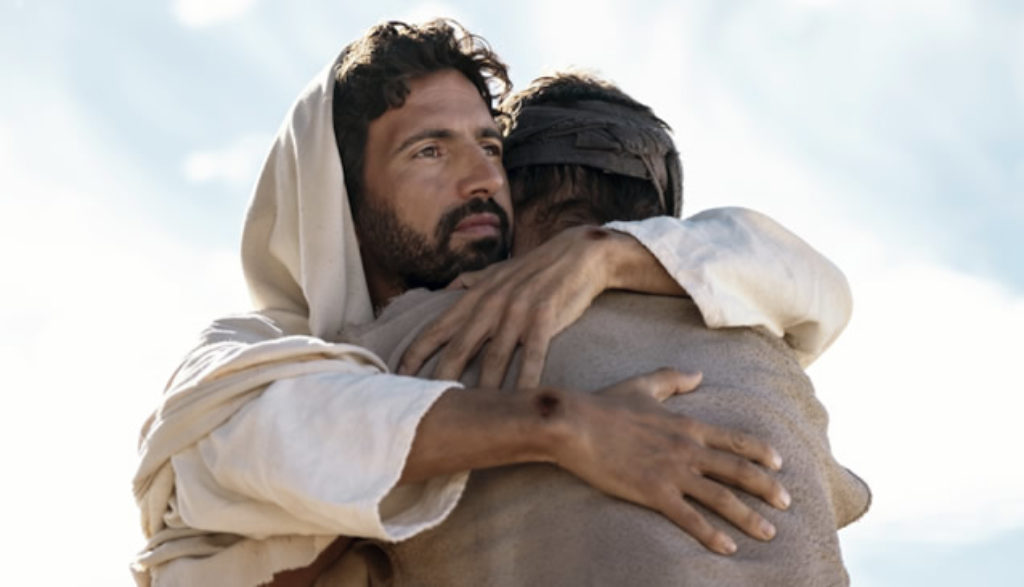
Dead Boy Detectives
Dead Boy Detectives targets teens in style and story. But it comes with very adult, problematic content.

When we read about Jesus, we read with 2,000 years of perspective.
When we celebrate His birth at Christmas, for instance, we know what’s in store come Good Friday. We know who He is, what He came for and what He’s going to do. Jesus’ story holds few surprises for those who’ve grown up in a Christian tradition. In entertainment vernacular, the finale’s been spoiled: The plot was leaked long ago.
But Jesus’ contemporaries had no such luxury. His story unfolded in real time. He surprised everyone back then¬—sometimes even those closest to Him.
That’s the vibe The History Channel chases with its latest faith-inflected miniseries, Jesus: His Life, which begins March 25 and runs for four weeks. It wants to introduce us not to Jesus as we know Him, but Jesus as His followers did. As such, the show focuses not so much on Christ Himself as it does the people who knew Him, followed Him, loved Him and, in some cases, hated Him.
The result is eight hour-long episodes, with each one focusing (more or less) on an important figure in the history of Jesus: Joseph; John the Baptist; Mary, Jesus’ mother; Caiaphas; Judas; Pontius Pilate; Mary Magdalene; and Peter. Taken together, they form a reasonably chronological narrative, beginning with Jesus’ miraculous conception and concluding with His last days on Earth.
The series’ dramatic recreations (and boy, do they get dramatic) are interspersed with expert interviews: Professors, priests and pastors all get their say, helping to ground Jesus’ narrative in the real world. He’s not some fairytale character, the show insists: Jesus walked and breathed and lived. And most everyone who encountered Jesus, whether friend or enemy, seemed to think that there was something special about Him.
That said, viewers shouldn’t look to Jesus: His Life as a cable-based sermon or a series that always offers accurate theological statements. Some of the experts here cast doubt on the literal veracity of the biblical accounts. For instance:
In the opening episode, Robert Cargill, a religion professor at the University of Iowa, suggests that the Roman census outlined in the Nativity story never actually happened. Instead, he argues that it was a literary device to get Jesus’ Nazarene parents to Bethlehem—fulfilling a biblical prophecy outlined in Micah. But then, the History Channel trots out another expert—New Testament scholar Ben Witherington III, in this case¬—to suggest that it’s “perfectly plausible” that the census took place, just as Luke says it did.
That seems to be History’s strategy in navigating the show’s controversial and volatile issues: It tries to acknowledge both a more secular understanding of Jesus’ times while still honoring the deeply faithful Christians it hopes will watch. Not easy work, that.
For me, the spiritual/historical balance History tried to strike worked—mostly. While the show may gently question the biblical narrative at times, more often it simply brings a more detailed context to the Gospels’ accounts of His life.
Contemporaries of Jesus, for instance, probably would’ve known that the “inn” we hear about in the Nativity was less a hotel and more somebody’s house with a spare room or two. Instead of a nice restaurant on the ground floor (like I always pictured as a kid), we’d find a stable, according to Cargill—the stable where Mary and Joseph ushered in not just a new life into the world, but a new light.
And Jesus: His Life treats the supernatural, miraculous elements of Christ’s journey with respect and seriousness, if not reverence. Angels appear where they ought. Miracles do indeed seem miraculous.
But the History Channel isn’t just out to inspire the faithful: It aims to entertain the masses, too. And as such, the story of Jesus’ life can sometimes take on a more breathless, action-packed aura than the biblical accounts strictly call for. The raw emotions we see here would feel more at home in a CW soap than a sober examination of history.
The show can get violent and bloody at times, too—not Passion of the Christ bloody, but enough to give you a sense of the violent days Jesus was a part of (and the violence Jesus himself was subjected to). Sexual content makes some by-the-book appearances, too. I mean, for us to understand why it was such a big deal for Joseph to stick around with Mary, we have to understand why the pregnancy itself was scandalous, right?
Those caveats, however, don’t detract from the inherent power of Jesus: His Life¬—a power that has everything to do with the original story, which is given new dimensions through the show’s experts.
The word Gospel means, of course, “Good News.” And any time the Gospel makes its way to secular television in a reasonably coherent, respectful fashion, that’s good news indeed.
As this episode’s title suggests, it focuses on Joseph, the husband of Mary. He tells us, “I had plans to make a life for myself. A simple one.” But his plans were upended by a certain miraculous conception that Mary nervously tells him about.
At first, Joseph believes that Mary—who was his betrothed, but not yet his wife—has been sleeping around. “You expect me to believe this?” He says angrily. “It’s the truth,” Mary tells him. That doesn’t keep Joseph from angrily tearing some molding off of the house he’s been building for the two of them.
Experts then tell us how important sexuality fidelity was to the Jewish people. “[Joseph] does believe in miracles,” New Testament scholar Ben Witherington tells us. “He just doesn’t believe they’ll happen in his case.” (Which might reflect the stance of some viewers as well.)
As subsequent events unfold, we walk through Joseph’s growing realization of just who Mary’s carrying and watch as they have a happy wedding. We also hear his worries: “[I’m] scared that I couldn’t love him as a real father,” he confesses.
The show grows more violent when the narrative shifts to King Herod and Rome’s occupation of Israel. Soldiers push and harass people even when just telling them to go to their hometowns for a census. And when King Herod orders every boy under the age of 2 to be slaughtered, we see a bit of the results of that order—soldiers barging into homes and raising their blades as people, especially children, scream. One soldier’s face is flecked with blood before he’s done.
Historians on the show compare Herod to Stalin and Kim Jong Un, and we’re told he had a harem of 500 women. He spills wine and consults magicians. We hear one misuse of the word “h—.”
Jesus claims that he is the Son of God at the Festival of Tabernacles, causing Caiaphas to fear for his life. Caiaphas seeks to have Jesus killed after Jesus raises Lazarus from the dead. Elsewhere, Jesus visits Mary, Martha and Lazarus. He also heals a blind man and teaches His disciples.
Religious officials are outraged at Jesus’ behavior and statements. They threaten to stone Him and plot to kill Him. The religious leaders also refuse to believe the testimonies of those whom He’s healed. At one point, leaders verbally berate a man Jesus has cured of his blindness, saying that the man is a sinner and a liar.
Historical, dramatized flashbacks include the Romans’ beating, stabbing and killing of Jews. A young boy witnesses that Roman brutality and remembers smelling death. Lazarus dies but then is raised to life by Jesus.
Historians share various thoughts and opinions on Jesus, the validity of biblical perspective and the events that took place surrounding the events of Jesus’ life.


Paul Asay has been part of the Plugged In staff since 2007, watching and reviewing roughly 15 quintillion movies and television shows. He’s written for a number of other publications, too, including Time, The Washington Post and Christianity Today. The author of several books, Paul loves to find spirituality in unexpected places, including popular entertainment, and he loves all things superhero. His vices include James Bond films, Mountain Dew and terrible B-grade movies. He’s married, has two children and a neurotic dog, runs marathons on occasion and hopes to someday own his own tuxedo. Feel free to follow him on Twitter @AsayPaul.

Dead Boy Detectives targets teens in style and story. But it comes with very adult, problematic content.

An elf mage contemplates on connection and regret as she watches her human friends grow old and pass away.